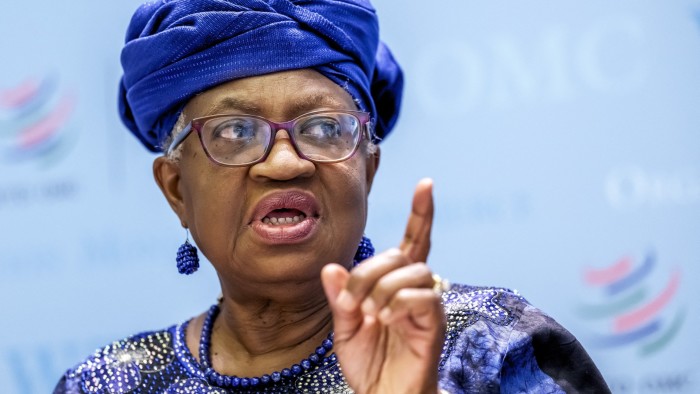Unlock the Editor’s Digest for free
Roula Khalaf, Editor of the FT, selects her favourite stories in this weekly newsletter.
Donald Trump’s tariff war will reduce North American exports by almost 13 per cent this year, the World Trade Organization has warned.
The trade body predicted on Wednesday that the US, Canada and Mexico would be the only region of the world where both export and import volumes would drop this year.
Its assumption was based on a scenario in which the US president’s tariffs were maintained at their current level of 10 per cent, without additional “reciprocal” duties being reinstated.
Trump has exempted many Mexican and Canadian products from his protectionist measures, as the US has a trade agreement with its neighbours, increasingly isolating the USMCA bloc from the global economy.
Overall, USMCA exports will fall 12.6 per cent this year while their imports are expected to decline 9.6 per cent, the WTO said. This compares with previous projections of more than 2 per cent growth in both trade categories before Trump’s tariff announcements.
Ngozi Okonjo-Iweala, the director-general of the WTO, told the Financial Times that growing fragmentation of global trade could divide the world into two trading blocks and “force countries to choose to be with one side or the other”.
“We’re very concerned that we’re seeing a potential decoupling of US-China trade. We really want to avoid a case of geopolitical fragmentation,” she said.
“That will lower global real GDP by 7 per cent in the long term,” she added, if countries retaliate and tariff uncertainty continues beyond summer.
The trade body said that if Trump’s higher “reciprocal” tariffs were reintroduced in July following a 90-day pause, global trade in goods could drop 0.8 per cent this year. If other countries retaliated, uncertainty could shave off another 0.7 percentage points, the WTO said.
Okonjo-Iweala said the US had in effect cut off all imports from China with its “reciprocal” tariffs, which are set at 145 per cent in addition to pre-existing duties, even as it temporarily exempted items such as smartphones and electronic equipment.
The WTO chief, a former Nigerian finance minister, said the poorest countries were already suffering.
“They are very vulnerable. Among the 10 economies facing the highest reciprocal tariffs five are least developed countries,” she said. “We should really think in terms of restoring them to the no-tariff situations that they were in previously.”
However, she conceded that the US had “a point” that countries were overdependent on its market, driving a huge trade deficit. “They need to diversify. I think over-concentration in the production of certain goods should be looked at,” Okonjo-Iweala said.
“To have 95 per cent of semiconductors produced in one part of the world does not build global resilience. To have 80 per cent of vaccines exported by 10 countries in the world does not build resilience,” she added.
Recommended
Okonjo-Iweala said she hoped her Geneva-based body, which has 166 members, could help broker a solution to the crisis.
The US was a founding member of the WTO but the Trump administration has increasingly shunned international organisations.
One of Trump’s first moves after taking office in January was to sign executive orders starting the process of leaving the World Health Organization and the Paris climate accord.
WTO members are now more interested in reforming the trade body so that it maintains a level playing field, Okonjo-Iweala said.
“One of the good things coming out of this is that members are seeing the value of the predictability and stability of the system created by the WTO.”
This article was corrected to say that the US is withdrawing from the World Health Organization, not the WTO



